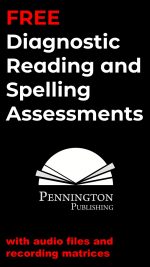Effective Spelling Practice
My last post discussed the role of the diagnostic pre-test as part of a balanced spelling program. I provided links for spelling word lists, including Vowel Sound-Spelling Patterns (for primary or remedial spellers), Outlaw Words (non-phonetic words), Dolch High Frequency Words, Commonly Confused Words, and the Eight Conventional Spelling Rules . I suggested that summer would be the best time to assess the spelling of your children to prepare for fall instruction and offered an essential resource: the comprehensive Diagnostic Spelling Assessment.
As I previously mentioned, each of the six posts will begin with a brief reflection about the instructional spelling component, follow with a rationale for teaching that component, and finish with some free instructional spelling resources. The components of each of the six posts are as follows:
1. Diagnostic Assessment 2. Sound-Spellings 3. Spelling Rules
4. Spelling Lists and Tests 5. Spelling Practice 6. Integrated Spelling and Vocabulary.
This week we explore how to use appropriate spelling practice as part of a balanced spelling program.
Reflection
□ I provide opportunities for students to practice words missed on the diagnostic pre-test.
□ I provide both memorization and writing practice for spelling words.
□ I connect spelling practice to structural analysis of the words.
□ I integrate spelling and vocabulary instruction in our practice.
Rationale
Effective spelling practice is not exclusively memorization. Good spelling practice connects to language development, vocabulary, structural analysis, auditory processing, and writing.
Language Development
The ways that words are spelled are determined by etymological influences. For example, the British spell the /er/ as “re” in theatre, while Americans spell the /er/ as “er” in theater. The ways that words are spelled are also determined by derivational influences. For example, the “ch” spelling in Greek has a hard /k/ sound, so the word chorus is spelled accordingly.
Vocabulary
The ways that words are spelled are often determined by the morphemes (words parts with meaning). For example, we spell emigrate because the prefix e means “out of,” while we spell immigrate because the prefix means “in or into.”
Structural Analysis
The ways that words are spelled are further determined by structural issues. For example, we spell begin with one n, but beginning with two n’s because of the consonant doubling rule. We pronounce unaccented vowels with the schwa sound in multi-syllabic words.
Auditory Processing
Spelling is an auditory skill, not a visual one. We “encode” the sounds we hear into the written alphabetic code. Good spelling practice involves syllabication rules, oral blending, and word fluency.
Writing
We spell in order to write coherently. Students need to practice effectively proofreading to catch inadvertent spelling errors.
A Model Grades 3-8 Spelling Scope and Sequence
Preview the Grades 3-8 Spelling Scope and Sequence tied to the author’s comprehensive grades 3-8 Language Strand programs. The instructional scope and sequence includes grammar, usage, mechanics, spelling, and vocabulary. Teachers and district personnel are authorized to print and share this planning tool, with proper credit and/or citation. Why reinvent the wheel? Also check out my articles on Grammar Scope and Sequence, Mechanics Scope and Sequence, and Vocabulary Scope and Sequence.
FREE DOWNLOAD TO ASSESS THE QUALITY OF PENNINGTON PUBLISHING AMERICAN ENGLISH AND CANADIAN ENGLISH SPELLING PROGRAMS. Check out these grades 3-8 programs HERE. Administer my FREE comprehensive Diagnostic Spelling Assessment with audio file and recording matrix. It has 102 words (I did say comprehensive) and covers all common spelling patterns and conventional spelling rules. It only takes 22 minutes and includes an audio file with test administration instructions. Once you see the gaps in your students’ spelling patterns, you’re going to want to fill those gaps.
Get the Diagnostic Spelling Assessment, Mastery Matrix, and Sample Lessons FREE Resource:
![]()



